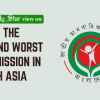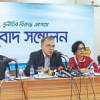It's far from acceptable
The overall human rights condition of the country's indigenous people remained far from acceptable in the year 2017 and little effort was made by the government to change it.
This is what is reflected in the report launched yesterday by Kapaeeng Foundation titled “Human rights report 2017 on indigenous peoples in Bangladesh”. Kapaeeng Foundation, a rights organization working for indigenous people of Bangladesh, released the report at a launching and dissemination programme with Sultana Kamal present as the chief guest, and Rabindranath Soren, chairperson of Kapaeeng Foundation, in the chair.
Referring to the arson attack in June last year at Longadu of Rangamati, the rights organisation stated in the report that none of the victims was able to save any of their properties during the mayhem. As many as 250 houses and shops had been looted before being set ablaze.
Thousands of adivasis, including women and children, had to hide deep in the jungle or take refuge in nearby villages. They became homeless overnight and had to spend nights without food and clothes in the open.
The government support and relief came later, but were inadequate.
As many as 2,000 acres of indigenous land had been brought under the process of acquisition for special economic zones, tourism complexes, business establishments and new reserve forests, according to the report.
Against the backdrop of the prevailing, unresolved land dispute in the Chittagong Hill Tracts, continuous land grabbing in the hilly regions persists.
Lawmaker Ushaton Talukdar said “influential people” have been grabbing adivasis' land with the help of the administration.
“The nation is proud to be a developing nation (as it seems to be becoming) but what should be considered is how far the country has gone regarding human rights,” he added.
People among the indigenous communities who raise their voice against rights violation are often labelled as extortionists, armed miscreants and terrorist in false cases. The year 2017 witnessed 10 killings and 141 arrests of indigenous rights activists and innocent villagers, according to the report.
Law enforcers and security personnel enjoy maximum impunity despite torturing indigenous people. In one such case, HSC examinee Romel Chakma was arrested on April 5. Two weeks later he died while being treated under custody of security personnel.
The culture of impunity poses challenges to establishing good governance and rule of law in the CHT, Kapaeeng Foundation said in the report.
In this regard, Prof Banchita Chakma, member of National Human Rights Commission (NHRC), pointed out a provision that forbids the commission to investigate any human rights violation committed by security forces. The provision has to be changed, she added.
Violence against indigenous women was also on the rise; 20 cases were reported in the plains and 28 in the CHT.
“Indigenous people are faced with the worst forms of human rights violation (in the country),” said Sanjeeb Drong, general secretary of Bangladesh Indigenous Peoples Forum.
Rights are violated in other countries as well but what is important here is whether the government acknowledges it and comes forward to change the scenario, he added.
Due to the settlement of Bangalees in the hilly regions since the 1980s, a demographic shift is seen, said Sadeka Halim, dean of the Faculty of Social Sciences, Dhaka University.
She also expressed concern that the socio-political scenario may worsen if Rohingyas settle in the region.
Kapaeeng Foundation, however, in the report, appreciated the distribution of pre-primary textbooks in five indigenous languages to an estimated 2,500 children last year.
The challenges of adivasis living far from urban establishments, and the shortage of teachers must be dealt with to make the initiative a success and to ensure their access to education, it added.
The government claims to have implemented 48 clauses out of 72 in the CHT peace accord, but according to the Parbatya Chattagram Jana Sanghati Samity, who signed the accord with the government in 1997, only 25 clauses have been implemented and 13 only partially implemented.
“The issue [of rights of indigenous people] is a political one,” Rabindranath Soren said.
Adivasis have to continue their movement for their rights. The country is progressing towards achieving the status of “developing nation” but indigenous people will not be benefitted if the situation remains the same, he added.
The obligation falls on the nation as a whole to respond to the injustice and wrongdoings that persist in society, Sultana Kamal said.
“We cannot let the culture of impunity continue,” she said, adding that the country is for all and so, elements of development should reach every citizen, irrespective of community.

 For all latest news, follow The Daily Star's Google News channel.
For all latest news, follow The Daily Star's Google News channel. 








Comments